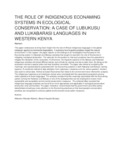| dc.contributor.author | Wakoko, Makarios Wanjala | |
| dc.contributor.author | Mudogo, Benard Angatia | |
| dc.date.accessioned | 2021-12-31T09:02:28Z | |
| dc.date.available | 2021-12-31T09:02:28Z | |
| dc.date.issued | 2020-04 | |
| dc.identifier.uri | https://e-journal.usd.ac.id/index.php/LLT/article/view/2842/pdf | |
| dc.identifier.uri | http://ir-library.mmust.ac.ke:8080/xmlui/handle/123456789/1972 | |
| dc.description.abstract | This paper endeavours to bring fresh insight into the role of African indigenous languages in the global campaign against environmental degradation. It examines how linguistic practises impact the natural environment. In this respect, the paper reports on the findings of an investigation that focused on the Econaming system in Kabarasi and Bukusu societies that sought to ascertain the role of Econames in mitigating ecological destruction. The rationale for this position is that such practices have the potential to mitigate the disruption of the ecosystem. Furthermore, the linguistic systems of the Bukusu and Kabarasi indigenous societies cherished different plants and animals by naming new-borns after them. By doing so the ecosystem earned a special place and was therefore venerated. The paper also aimed at comparing the meanings and representations associated with the Econaming systems in both Kabarasi and Bukusu naming systems. A combined method of data elicitation from Lubukusu-Lukabarasi and the native speaker’s intuition was used to collect data. Animal and plant Econames that relate to the environment were inferred for analysis. The indigenous Lubukusu and Lukabaras names were correlated with the associated ecosystems among native speakers of these languages. The analysis revealed that the meanings associated with the Econaming system among the Kabarasi and Bukusu is one of the strategies that can be employed to ensure more sustainable and acceptable environmental preservation measures. The collected data revealed that indigenous language practices are found to be more appropriate and applicable in ecological preservation among the rural communities. The paper, therefore, recommends that the government and other policy-stakeholders should pay more attention to the Econaming practises so that local people's conservation practises are recognised to enhance global environmental conservation measures. | en_US |
| dc.language.iso | en | en_US |
| dc.publisher | LLT Journal: A Journal on Language and Language Learning | en_US |
| dc.subject | ROLE, INDIGENOUS, ECONAMING, SYSTEMS, ECOLOGICAL, CONSERVATION, LUBUKUSU, LUKABARASI, LANGUAGES | en_US |
| dc.title | THE ROLE OF INDIGENOUS ECONAMING SYSTEMS IN ECOLOGICAL CONSERVATION | en_US |
| dc.title.alternative | A CASE OF LUBUKUSU AND LUKABARASI LANGUAGES IN WESTERN KENYA | en_US |
| dc.type | Article | en_US |

